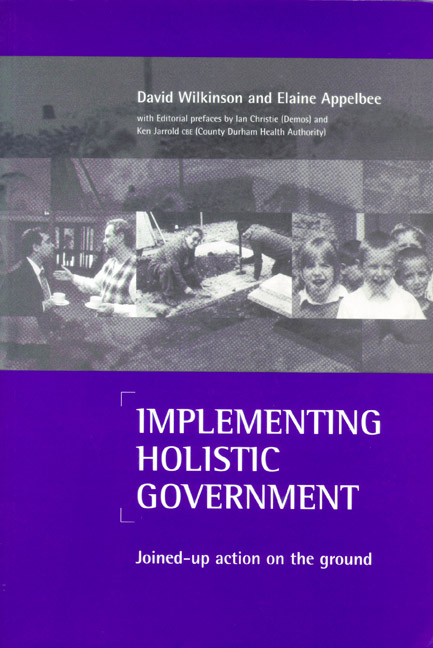Book contents
- Frontmatter
- Contents
- Editorial preface
- Editorial preface
- Acknowledgements
- Summary
- 1 Setting the context
- 2 The functional inheritance and its consequences
- 3 The public service, community interface
- 4 Change that works – sustaining community and quality of life improvement
- 5 Change that works – sustaining organisational and whole system change
- 6 Developing the middle ground: where bottom-up meets top-down (a third way for local governance?)
- 7 Improving sustainable quality of life: the benchmark for Best Value
- 8 Joined-up action on the ground: six key issues that have to be addressed
- 9 Working in the middle ground: recommendations to promote joined-up action on the ground
- References
6 - Developing the middle ground: where bottom-up meets top-down (a third way for local governance?)
Published online by Cambridge University Press: 05 July 2022
- Frontmatter
- Contents
- Editorial preface
- Editorial preface
- Acknowledgements
- Summary
- 1 Setting the context
- 2 The functional inheritance and its consequences
- 3 The public service, community interface
- 4 Change that works – sustaining community and quality of life improvement
- 5 Change that works – sustaining organisational and whole system change
- 6 Developing the middle ground: where bottom-up meets top-down (a third way for local governance?)
- 7 Improving sustainable quality of life: the benchmark for Best Value
- 8 Joined-up action on the ground: six key issues that have to be addressed
- 9 Working in the middle ground: recommendations to promote joined-up action on the ground
- References
Summary
Only connect…. (Forster, 1910)
Public management currently lacks a public. Users have to be rebuilt into a public with a communal feeling and communal outlook. There has to be a method for doing this. (Corrigan and Joyce, 1997, p 431)
Social cohesion: strengthening or weakening?
It is quite possible to paint a picture of weakening social cohesion and the consequent deterioration of civic society and in some parts – the worst estates for example – its collapse. From this perspective, the key causes are widening inequalities, the continuing rise of economic and social individualism, weakening family structures, marriage breakdown, labour market fluidity and geographic mobility driven particularly by Anglo-American responses to globalisation. This has been an issue of increasing concern for a number of writers and commentators (Donnison, Gray, Willets; also ‘The report on wealth creation and social cohesion in a free society’ by the Commission on Wealth Creation and Social Cohesion set up by the Rt Hon Paddy Ashdown MP, leader of the Liberal Democrats). It is evident from the ground covered so far that these are very real concerns and underlie some of our most intractable social problems. This seems to be happening in a world where perhaps a majority are increasingly money rich and time poor while a substantial number of others are money poor and time rich.
But at the same time, it is also possible to write another story. Over recent years it appears that there has been an upsurge in communitybased, bottom-up initiatives. Much of this has happened despite local government and public service organisations rather than because of them. It has also taken place against a background of social fragmentation. Yet voluntary activity is alive and well. Membership of voluntary organisations steadily increases, while over the long term, that of political parties falls.
Geoff Mulgan and Charles Landry, for instance, describe the enormous range of clubs, self-help, mutual help, voluntary activity and associated organisations.
If you explore any city, town or neighbourhood in Britain, you soon find an extraordinary undergrowth of voluntary action. Amateurs, enthusiasts and the committed join together in self-help groups, clubs, associations and federations, in a myriad of activities stretching from health, social welfare, leisure, recreation, education, to community development and conservation. (Mulgan and Landry, 1995, p 14)
- Type
- Chapter
- Information
- Implementing Holistic GovernmentJoined-Up Action on the Ground, pp. 91 - 118Publisher: Bristol University PressPrint publication year: 1999



